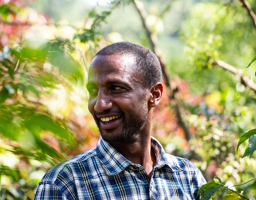Khalid is well aware that this natural heritage is an essential factor in the specificity of his productions.
Pick your crop :
Aromatic notes:
Spot price
€/kg
A constant concern for the preservation of the natural environment of these lands
Marketing tools & Certifications
POS displays, postcards, QR codes for packaging, ...
- Ethiopia
Origin
region
Limmu terroir
Gera - Khalid Shifa
Producer
Species
Arabica Variety
Heirloom
Process
Washed
Drying
Drying beds
Packaging
60kg - Jute bags
Altitude
2100 Harvest period
December - February Type of harvest
Manual
Terroir Gera
Gera is located around forty kilometres south-west of Jimma, in the district of the same name. Our agronomists visit Gera regularly to discuss harvesting, drying and storage techniques with the farmers. Shambé, who works in our Addis Ababa office, is in regular contact with them and visits Gera several times a year.

Meet Khalid Shifa
A few words about Khalid Shifa
Khalid Shifa at the forefront of coffee suppliers for Belco from Ethiopia, primarily processing from sites such as Echemo, Badaye, and Loya Sedi processing stations all in Oromia Region, Jimma Zone. The harvest season typically is from November to mid-January, but this year they started harvesting in September/October due to unexpected climate changes.
Khalid’s team prepares extensively for each harvest, starting as early as August. Preparations include servicing machines, maintaining water and electricity supplies, and readying equipment and beds. They clean nets, replace bed wood, and prepare warehouses, ensuring the sites are organized and functional before the harvest begins. Khalid’s team also trains employees on collection standards, financial processes, and proper documentation. Financial challenges, labour shortages, and unpredictable weather are persistent obstacles, yet Khalid’s team works to address these issues through careful workload management, coordination among sites, and detailed planning.
Khalid’s operations face significant challenges, particularly related to weather variability, human resource management, and financial limitations. To manage these challenges, they strategically divide workloads across production sites. Coordination involves the management of transport logistics, quality control, and regular financial assessments. In 2021, they started an out-grower farmer training program and have since expanded their farmers list from 27 to 110 out growers total for all stations. These partnerships are built on agreements that cover cherry purchase prices and commissions, along with training in organic farming practices, focusing on compost use instead of chemical fertilizers.
Quality control is integral to Khalid Shifa's business. They conduct both internal and external audits to maintain high standards. The internal audits involve detailed questionnaires covering various aspects of farm management, while external audits are done by ECOCERT, which provides organic certification. This rigorous certification process starts in June and usually takes three months, include inspections of farm practices, purchase records, and export processes to confirm traceability and compliance throughout production.
Licensing is another critical aspect of operations. Khalid’s business requires annual renewals for several licenses: the Supplier License, Export License, and Grower License. These renewals are managed carefully to ensure readiness for the coffee harvest.
The processed coffee is packaged in 60 kg bags for washed beans and 75 kg bags for natural beans to be moved from Agaro warehouse to Addis Ababa. It is then prepared for transport in alignment with sales contracts. Transport logistics involve obtaining permissions from local authorities, including the woreda, Zone, Jimma ECX and coffee and tea authority. The coffee is transported from Agaro to Addis Ababa, passing through several checkpoints, including Jimma, Welkite, and Dimtu. Issues like system malfunctions, long wait times, and road safety concerns often delay this process. Upon arrival in Addis, the coffee undergoes a final round of processing at a contracted dry mill, where it is cleaned, graded, and packed for shipment.
In addition to their coffee production activities, Khalid Shifa is dedicated to community projects. They completed a 4 km road construction project from Echemo to Badaye, utilizing their trucks and contractors, financed with 4 million birrs. They also support local farmers with training on compost production and sustainable agricultural practices. Additionally, they support Birbirsa Elementary School by covering maintenance costs and providing teaching materials. Expansion projects are in the works, including construction of a guest house, office, and rest area for workers.
Khalid is collaborating with BELCO and Roasters on an Agroforestry Nursery Site Establishment project. This initiative aims to raise awareness about the link between coffee cultivation, biodiversity, and climate change. By integrating agroforestry practices, the project seeks to enhance farm productivity, promote biodiversity, and protect the environment.
Overall, Khalid Shifa’s approach to coffee production reflects a commitment to quality, sustainability, and community development, reflecting his deep connection to the coffee industry and his determination to innovate and grow within it.
Analyzed to the nearest gram
Find detailed physical and sensory analyzes of your coffee in the quality sheet with:
- Density
- The humidity level
- Water activity
- Colorimetry
- The sieve
- The nature of the defects
- The score and its details
- The aromatic profile (downloadable)
Equipments selection
Unit price
€ ex.tax/U
From xx products
€ ex.tax/U
Unit price
€ ex.tax/U
From xx products
€ ex.tax/U
Unit price
€ ex.tax/U
From xx products
€ ex.tax/U
Unit price
€ ex.tax/U
From xx products
€ ex.tax/U
Unit price
€ ex.tax/U
From xx products
€ ex.tax/U
Unit price
€ ex.tax/U
From xx products
€ ex.tax/U
Unit price
€ ex.tax/U
From xx products
€ ex.tax/U

